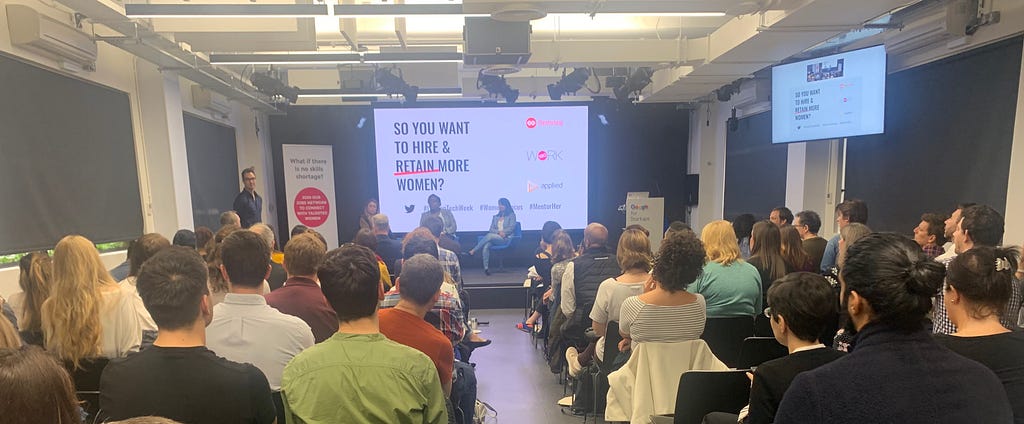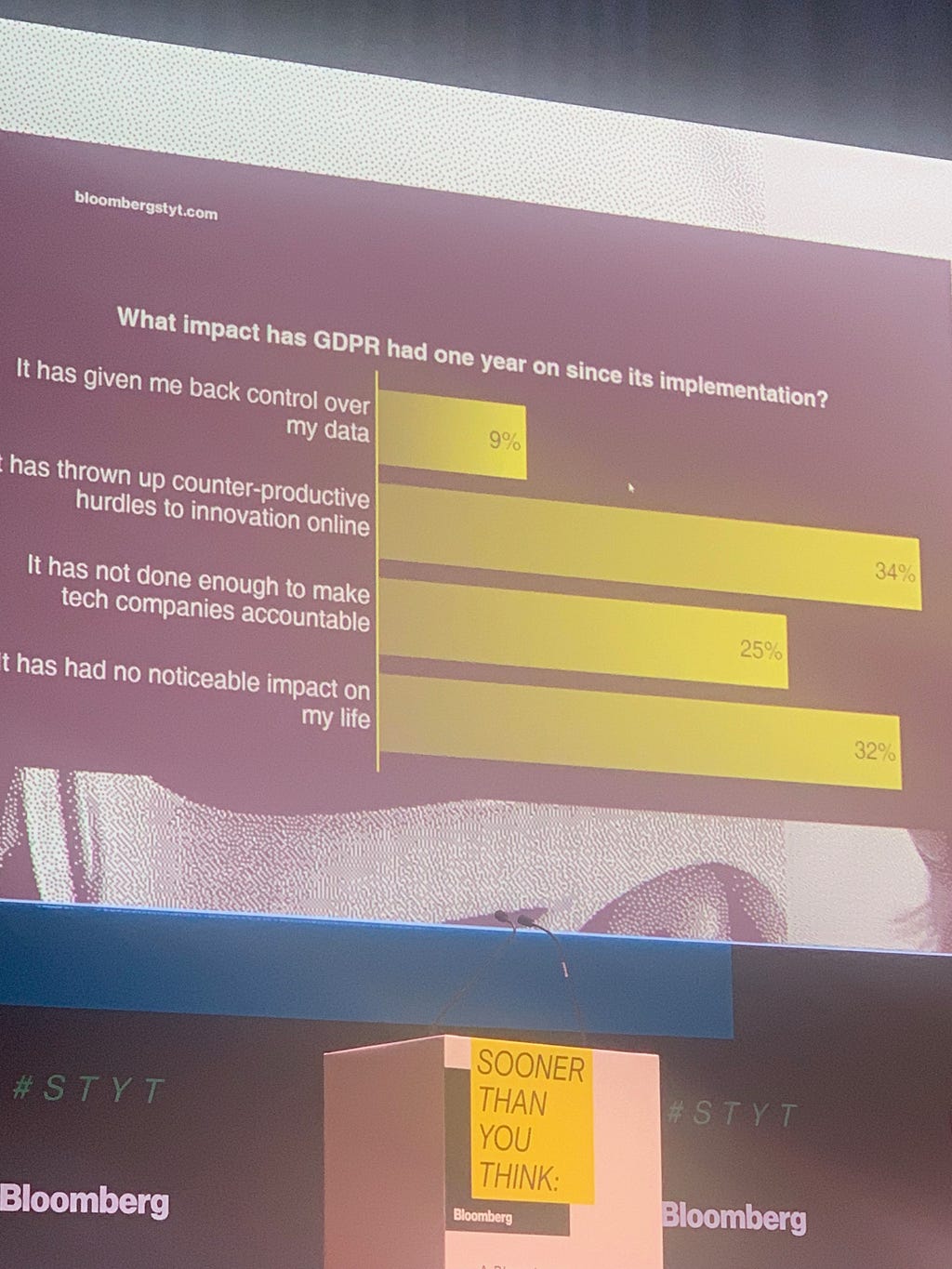Latest news about Bitcoin and all cryptocurrencies. Your daily crypto news habit.

London Tech Week consists of seven days of jam-packed events, conferences, summits, workshops, meet-ups and enough fireside chats to heat-up a whole nation. Subject matter ranges greatly with all types of organisations throwing their hat in the ring from corporates and scaling companies to governments and media outlets. While the topics themselves vary greatly, all of London Tech Week’s events share a common thread — they are sharing knowledge to help us innovate.
With the speed of ‘digitalisation’, it’s an invaluable exercise to dive into all that the week can offer and soak up the diversity of ideas. The Hassl team travelled 16,893km from Melbourne to London as part of the Australian government’s trade mission so for those who weren’t able to attend here’s a summary of actionable trends that’ll keep us busy until the next tech week:
Use technology to hire a diverse workforce
 Google Startups, So you want to hire & retain more women?
Google Startups, So you want to hire & retain more women?
Diversity is an HR goal for corporates, for scaling tech businesses it’s a necessary part of our growth strategy. We need diversity of minds in order to problem solve effectively and find creative ways to enter markets. When it comes to gender, while in the UK there is an average 18% pay gap, in technology the gap sits at 25%.
Here’s a couple of great global companies using technology to solve these issues:
- Work180, a platform that pre-screens employers to ensure they support women, have proved a 28% increase in staff retention rates from companies pledging to hire more when.
- Applied, a suite of hiring tools that use behavioural science to remove bias from the recruitment process, advocate for incorporating predictive validity to the job recruitment process.
Ultimately a diverse workplace comes from the top down. When you’re growing your c-suite think — do they all look like me?
Time to actually get ready for AI
While 25% of the Bloomberg Live audience believed AI will never reach human-level capabilities, Google’s head of AI Scot Penberthy, who has spent his whole career working with machine learning, thinks they’ll be human-level AI within our lifetimes. The jury is out and AI is set to have disruptive effects across all industries similar to the internet, so it’s time to start taking it seriously.
The best place to start is with a clear understanding of what it is. AI is a technology that can exhibit cognitive function that we know as being human. A great example of this is machine learning, where algorithmic models allow computers to learn like humans. Here’s a definition without the word algorithm:
“For 75 years we’ve been telling a computer what do to and now the algorithm can tell us what to do.”
Nigel Toon, Co-Founder of Graphcore
In practical terms, it means that tasks like image processing that used to take a human three days can now be done by a computer in under an hour.
Helen Mayhew, CEO of QuantumBlack, described the role of people in AI. We’ve got to first accept and understand. For start-ups we need to take the time to learn about what AI could be doing and create a culture in which it becomes a tool for our team. Secondly, we’ve got to learn to interpret outputs, machine learning specifically can read our data and tell us some fascinating insights but (at this stage!) it’s up to your team to implement these insights.
‘Artificial Intelligence is a universal predictor and creator.’ Scott Penberthy, Google AI
As a growing business, we should also be aware of the current barriers to mainstream use of AI. The current carbon footprint of AI is too high, Google’s Scott made a call out for new architecture that can match the human brain and unlike a computer, our brain takes on 25 watts to computer a maths equation.
So what can AI be used for and how can start-ups get involved? Whilst larger corporates are looking at ways in which AI can automate tasks there’s an opportunity for start-ups to use market-place AI tools to model customers and processes to offer better user experiences than humans can. An example of this is Hassl brain, a business feature we built using simple machine learning that can take over any repetitive project management tasks within your web app.
In terms of tools that can empower start-ups, the best place to start is Google’s Tensorflow and Python tutorials or Amazon Web Service’s Sagemaker. AI can empower people and entrepreneurs to turn a creative idea into a product from anywhere in the world.
Take cybersecurity seriously
Amongst the hundreds of Bloomberg live audience, only 9% believed GDPR has given them control over their data whilst 34% believed it has thrown up counterproductive hurdles to innovation online. While the audience of entrepreneurs and technologist may be less than impressed with the new European data regulations, regulations are definitely not going anywhere. Good old Mark Zuckerberg is currently under investigation for eleven breaches of GDPR and although it doesn’t seem to be damaging his business too much, it’s time for scaling businesses to pre-plan for disasters.
Helen Dixon, head of GDPR in Ireland, made a call for self-regulation of data security where possible due to the sheer volume of cloud-based technology businesses. When we take into account growing pressures to ensure the security of customer data and growing Cybersecurity threats, it’s becoming more important than ever to create and implement a solid strategy to counteract any data or privacy breaches.
So how do we self-regulate? The best place to start is free online advice from trustworthy sources. Many government departments offer cybersecurity resources and checklists. Then pick a provider who can offer corporate-level security measures for a fraction of the cost. At Hassl we use Amazon Web Services hosting and security products.
#LondonTechWeek #Trends #Startup
by Lauren Crystal, Hassl
Three trends for start-ups from London Tech Week was originally published in Hacker Noon on Medium, where people are continuing the conversation by highlighting and responding to this story.
Disclaimer
The views and opinions expressed in this article are solely those of the authors and do not reflect the views of Bitcoin Insider. Every investment and trading move involves risk - this is especially true for cryptocurrencies given their volatility. We strongly advise our readers to conduct their own research when making a decision.


